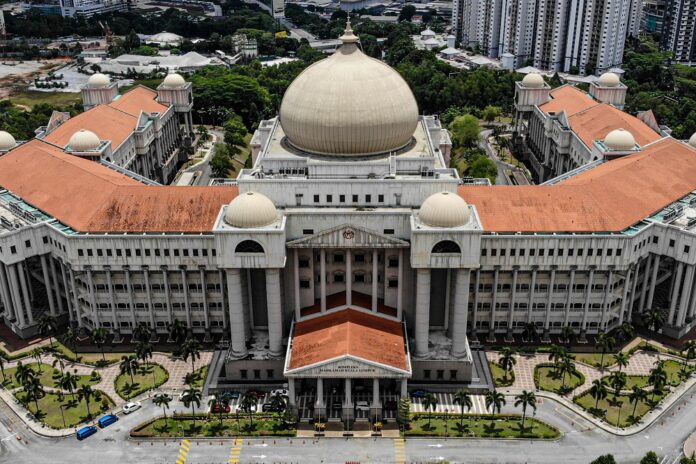An aerial view of the Kuala Lumpur High Court April 23, 2020. — Picture by Hari Anggara
KUALA LUMPUR, Oct 15 — Malaysia’s score in the global rule of law index dipped 1.4 per cent to 0.57, ranking 54 out of the 139 nations surveyed in the World Justice Project’s (WJP) Rule of Law Index.
Last year, Malaysia’s ranking in the index rose four rungs, or 5.1 per cent, compared to 2019, putting it in 47th place out of 128 countries and jurisdictions worldwide.
It placed seventh out of 15 countries in the East Asia and Pacific region, and 12th out of 42 upper middle income countries.
In its report, WJP said that 74.2 per cent of countries surveyed for the 2021 index had experienced declines in rule of law, while 25.8 per cent saw improvements. The countries that declined in the index account for a whopping 84.7 per cent of the world’s population, or 6.5 billion people.
Singapore also slipped three spots this year to 17th spot.
The report is the first in this annual series issued since the Covid-19 pandemic, and shows multi-year negative trends worsening during this period.
Performance is assessed using 44 indicators across eight categories, each of which is scored and ranked globally and against regional and income peers.
The eight factors used in its assessments are: constraints on government powers, absence of corruption, open government, fundamental rights, order and security, regulatory enforcement, civil justice and criminal justice.
Malaysia’s score this time around places it seventh out of 15 countries in the East Asia and Pacific region and 10th out of 40 among upper-middle income countries, according to the report.
Countries in the East Asia and Pacific region were listed as follows: Australia, Cambodia, China, Hong Kong, Indonesia, Japan, Korea, Mongolia; Myanmar, New Zealand, Philippines, Singapore, Thailand and Vietnam.
Globally, Malaysia ranked 59 for constraints on government powers, 49 for absence of corruption, 104 for open government, 84 for fundamental rights, 44 or order and security, 46 for regulatory enforcement, 34 for civil justice and 45 for criminal justice.
Neighbouring Singapore also showed some decline in performance with a 0.78 per cent score. Within the East Asia and Pacific region, it ranks fourth.
Singapore ranked 38 for fundamental rights, 34 for open government and 32 constraints on government power.
Globally, however, the island republic ranked in the top 10 for other categories; third for both the absence of corruption and order and security and fourth for regulatory enforcement. Last year it emerged top in the order and security category.
WJP said that areas which saw greatest declines include constraints on government powers, civic space, timeliness of justice, and absence of discrimination.
“With negative trends in so many countries, this year’s WJP Rule of Law Index should be a wake-up call for us all,” WJP co-founder and chief executive, Bill Neukom said, in a statement analysing the findings.
The top three performers this year were Denmark, Norway, and Finland.
WJP reported that the declines were widespread and seen in all corners of the world.
“For the second year in a row, in every region, a majority of countries slipped backward or remained unchanged in their overall rule of law performance. Over the past year, 82 per cent of countries in the index experienced a decline in at least one dimension of civic space (civic participation, freedom of opinion and expression, and freedom of assembly and association) and 94 per cent of countries in the index experienced increased delays in administrative, civil, or criminal proceedings,” it said.
The countries with the biggest improvement in rule of law in the past year were Uzbekistan (4.1 per cent), Moldova (3.2 per cent) and Mongolia (2 per cent). Countries with the biggest decline in rule of law in the past year were Belarus (-7.5 per cent) and Myanmar (-6.3 per cent). Nigeria, Nicaragua, Kyrgyz Republic, and Argentina tie for the third biggest decline at (-3.7 per cent).
The WJP Rule of Law Index is the world’s leading source for original, independent data on the rule of law. Now covering 139 countries and jurisdictions, the index relies on more than 138,000 household surveys and 4,200 legal practitioner and expert surveys to measure how the rule of law is experienced and perceived worldwide. The index provides current and reliable information to policy makers, civil society organizations, academics, citizens, and legal professionals, among others, and is intended to encourage policy reforms, guide program development, and inform research to strengthen the rule of law.
(WJP meanwhile, is an independent, multidisciplinary organisation working to create knowledge, build awareness, and stimulate action to advance the rule of law worldwide.


